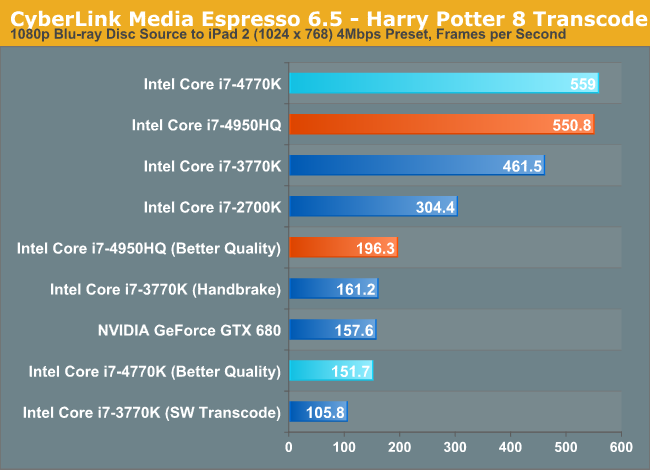The Haswell Review: Intel Core i7-4770K & i5-4670K Tested
by Anand Lal Shimpi on June 1, 2013 10:00 AM ESTQuick Sync Performance
With more graphics EUs under the hood of all desktop Haswells (at least those launching today), Quick Sync performance improves a bit over Ivy Bridge. Intel claims to have focused heavily on improving the quality of Quick Sync transcodes however in my testing I saw a slight regression in quality. I didn’t have a ton of time to dig further to find out what’s going on but I plan on doing so post-Computex. Update: It looks like I wasn't alone in seeing an image quality regression. Haswell QSV image quality is worse than on IVB as Ganesh found.
The other big news is Handbrake now officially supports Quick Sync, something Ganesh will be testing with his HTPC look at Haswell.
Needless to say, Quick Sync performance is better on Haswell than on Ivy Bridge. And it’s even better if you happen to have a Haswell with a 128MB L4 cache.











210 Comments
View All Comments
Da W - Saturday, June 1, 2013 - link
It confirms Temash tablets will be the GPU+CPU performace / power / price ratio to beat.takeship - Sunday, June 2, 2013 - link
At 8-15W. What size market is that again? It's like saying Amtrak has a better cost/distance than a Prius. Yes, but so what?Dal Makhani - Saturday, June 1, 2013 - link
its not disappointing at all, its gains, and any gains matter on an annual schedule. As long as it beats Ivy by any percentage, its progress. You know Intel's goals are not IPC related as much as mobile, so dont rant when all the facts are in front of you.peterfares - Saturday, June 1, 2013 - link
You must have missed the part where S0ix isn't available on the desktop parts. How about you wait until the MOBILE and ULV processor tests are in before you start ranting.Jammrock - Saturday, June 1, 2013 - link
The point of Haswell is not to drastically improve performance. Haswell is designed to move x86 into the tablet and mobile market with drastically improved idle and low power performance. Skylake, in roughly 2015, will likely be the next big performance boost.Hector2 - Sunday, June 2, 2013 - link
"Haswell" isn't going into tabletsKlimax - Sunday, June 2, 2013 - link
It does - Surface Pro class.(TDP 10W)thebeastie - Sunday, June 2, 2013 - link
Well I am happy to see the 4th gen release. And yay PCI is now officially gone. Shouldn't there be a memorial ceremony? And maybe a trophy? :)Kudos to the first posters looks like they some what actually read the review, even tho I don't know if I agree with your comments.
klmccaughey - Monday, June 3, 2013 - link
Yes, it is great to see PCI finally dead and buried. It's been a bit like having a tow bar on a ferrari this last few years. Hoorah for the death of PCI!!! :)GullLars - Sunday, June 2, 2013 - link
Where this will probably shine is in mixed workloads. Not overclocking for gaming or production.It will be easier to put Haswell into (G)HTPC builds at mini-ITX and µATX formfactors and keep noise down while still having great burst performance. The 4770K seems to be not worth it for overclockers that have got good Sandy/Ivy chips.
I think i may upgrade my parents living room PC to something like a mini-ITX build with i3-42xxT, and just transfer the SSD (Force GT 120GB) and RAM (8GB 1600 SO-DIMM). It should be a substantial upgrade from E-350 and almost fit the same power envelope for their use cases.
I'm looking more forward to more info on Ivy-E. I'm happy with my 3930K with a decent OC, but if Ivy-E can bring the power/performance ratio down without bringing performance down or heat issues, i might upgrade :)